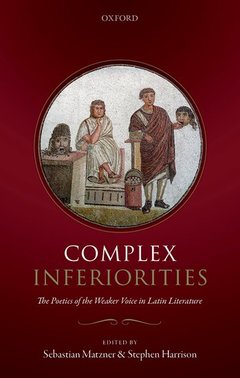Description
Complex Inferiorities
The Poetics of the Weaker Voice in Latin Literature
Coordinators: Matzner Sebastian, Harrison Stephen
Language: English
Publication date: 11-2018
336 p. · 14.8x22.4 cm · Hardback
336 p. · 14.8x22.4 cm · Hardback
Description
/li>Biography
/li>
This volume investigates an important and surprisingly widespread phenomenon in Latin literature, which has to date received little sustained discussion: the deliberate assumption of a weaker voice by speakers who in fact hold sufficient status not to be forced into this position. Though often associated with the markers of imperial hegemony and elite speech, Latin literature evinces a remarkably broad range of strategies designed to enable the adoption of a markedly disempowered voice- from topoi such as recusatio (professing a lack of ability to write in status-conforming, superior genres) and rhetorical devices such as prosopopoeia (artfully and strategically adopting a persona to garner favour, even when this means temporarily forfeiting one's higher status and discursive privileges), to the long-silenced female heroines of Ovid's Heroides and satire's irreverent take on the great and the good by framing its narratives as being articulated 'from below'. Even large-scale cultural self-positionings fall within this scope, be they expressions of Roman cultural inferiority vis-à-vis classical Greece or the tensions that arise between humble (yet spiritually superior) Christian writers and their grand, canonical, and classical (yet pagan) predecessors. The intersecting case studies offered in Complex Inferiorities examine this phenomenon in a wide range of genres, periods, and authors. By demonstrating that re-negotiating alleged weakness constitutes a central activity in Latin literature, this volume reveals the extent of the literary and cultural-political possibilities opened up by assuming and speaking in voices of weakness and inferiority. Authored by experts in their fields, the individual chapters explore the crucial role of the 'weaker voice' in establishing, perpetuating, and challenging hierarchies and values in a wide range of contexts- from poetics and choices of genre, to social status and intra- and intercultural relations- thereby offering invaluable insights not only for the study of classics, but for literary and cultural studies across the humanities.
Sebastian Matzner is Senior Lecturer in Comparative Literature at King's College London. His research focuses on interactions between ancient and modern literature and thought, especially in the fields of poetics and rhetoric, literary and critical theory, history of sexualities, LGBTQ studies, and traditions of classicism. He has published several articles and book chapters in these fields and is the author of Rethinking Metonymy: Literary Theory and Poetic Practice from Pindar to Jakobson (OUP, 2016) as well as co-editor of a forthcoming OUP volume entitled Metalepsis: Ancient Texts, New Perspectives (with Gail Trimble). Stephen Harrison is Professor of Latin Literature at the University of Oxford, and Fellow and Tutor in Classics at Corpus Christi College. His main research and teaching interests are in Latin literature and its reception. He has written monographs on Vergil, Horace, and Apuleius, and has edited, co-edited, or co-authored more than twenty books on Vergil, Horace, the Roman novel, Classics and literary theory, and Latin literature in general, as well as on the reception of classical literature. His recent publications include Victorian Horace: Classics and Class (Bloomsbury, 2017) and a commentary on Horace Odes 2 (CUP, 2017).
© 2024 LAVOISIER S.A.S.




